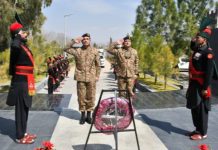ISLAMABAD, JAN 18 /DNA/ – While expressing concern over the increasing number of Covid-19 cases following the emergence of Omicron variant in Pakistan, stakeholders have emphasized the need for more coordinated efforts by the government as well as private organizations to effectively cope with this new pandemic-related situation.
These remarks were expressed at an event organized by the Italian INGO Cesvi Pakistan to celebrate the achievements and reflect upon the lessons learned of the project ‘Improving National Capacity to Respond to COVID-19 Pandemic in Pakistan’ implemented across 24 districts of all four provinces of Pakistan. The project was funded by the EU Civil Protection and Humanitarian Aid Operations (ECHO) for a duration of 18 months. The event was attended by Country Director CESVI Pakistan Farhan Ahmed Khan, representatives of the consortium INGOs, PDMAs, Health Departments from all four provinces, members of civil society and media persons.
Addressing at the occasion, Dr. Nausheen Hamid (Parliamentary Secretary Health) mentioned that the Government of Pakistan made significant efforts for COVID-19 containment and prevention. Soon after the emergence of the pandemic, the government responded efficiently through upgradation of testing labs and installation of mobile testing labs at border crossing areas. In addition, for real-time COVID-19 situation monitoring and response efforts, the efforts of the NCOC and Central Health Administration Department are commendable in this regard.

Dr. Stephen Langrell, Team Leader Rural Development and Economic Cooperation section of the European Union Pakistan, acknowledged the efforts of consortium partners for providing assistance to 2.5 million people across Pakistan in these testing times. He said that ECHO found it essential to support the Government of Pakistan in combating COVID-19 in the country.
Earlier, Farhan Ahmed Khan while giving an overview of the project said that the project successfully endeavored to strengthen the capacity of health care providers and equipped the High Dependency Units and Intensive Care Units (ICUs) of 324 health facilities across all four provinces of Pakistan. He also mentioned that along with the components of capacity building training, Mental Health and Psychosocial Support (MHPSS), WASH support, the project has provided essential COVID-19 treatment and diagnostic equipment, testing kits, non-COVID and non- medical equipment, and fixtures, PPEs and disinfection supplies.

Besides, a panel discussion was also held in which the Country Directors of all seven consortium partners shared their field experiences, best practises and key challenges experienced during the implementation of the project. The panelists included Farhan Ahmed Khan from Cesvi, Waqas Ahmed from MdM, Mubashir Ahmed from Concern Worldwide, Aisha Jamshaid from WHH, Dr. Arjumand Nizami from Helvetas, Sarfraz Laldin ACTED, Rafiuallah Khalil from IMC.
The panel discussion was followed by the stakeholder feedback session in which government representatives and health officials expressed their opinions and thanked the support of consortium partners for providing essential Health support. The stakeholders included Dr. Niaz Muhammad (DG Health KPK), Dr. Noor Muhammad (DG Health Baluchistan), Dr. Jamil Ahmed (DHO Sukkur), Dr. Ubaid Ur Rehman (Regional Director General Health, South KP), Dr. Ahmad Usman (Deputy Secretary Administration, Primary &Secondary Health Punjab) and Dr. Muhammad Ali (CEO District Health Authority, Rajanpur). At the end of the event, souvenirs were given to the participating guests.

















